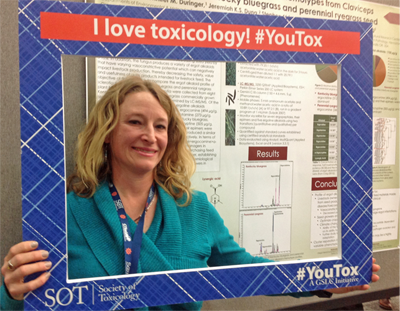SOT Member Jennifer M. Duringer, PhD, is an academic researcher at Oregon State University investigating the effects of mycotoxins found in food on human and animal health. She became a member of SOT as a graduate student and has remained involved “due to the networking and broad array of connection opportunities provided by the SOT Annual Meeting and ToxExpo, as well as presentations about the latest advances in the field of toxicology.”
What is your area of work/research?
I work on the physiological effects that mycotoxins (secondary metabolites produced by fungi) have on human and animal health. One of my areas of expertise is on detection methodologies that allow me to determine concentrations of these naturally produced toxicants in feed materials and biomatrices such as blood, urine, and feces.
 What research were you presenting at the 2017 SOT Annual Meeting and ToxExpo? (pictured)
What research were you presenting at the 2017 SOT Annual Meeting and ToxExpo? (pictured)
My work on the detection of a group of mycotoxins known as ergot alkaloids responsible for the disease ergot in grass seed crops. I was determining the pattern of specific ergot alkaloid metabolites produced in different grass species and how this difference might make one grass species more toxic to predatory herbivores than another.
How did you become interested in toxicology?
In graduate school, I started in comparative veterinary medicine, but quickly learned that I liked to partner my analytical chemistry background/skills with the clinical signs I was seeing in animals consuming toxic plants. Toxicology is such a broad discipline, encompassing pieces from many of the sciences, that it seemed like a natural fit to cover all the topics I was interested in. Luckily, the place I was enrolled (Oregon State University) had a toxicology program, so I switched to that and never looked back!
What has been your favorite moment or experience while pursuing your scientific career?
Meeting and bringing people together, over and over again. You meet such interesting, creative, insightful folks who have such passion for what they do. Putting people with different perspectives together to solve a problem generates ideas that would likely be difficult to come up with on an individual basis. Then you get to work with them, which can include visiting places around the globe and interacting with various cultures and approaches to science.
If you were not a scientist, what would you be and why?
I would lead some sort of outdoor leadership institute for kids and teach them about leading a healthy lifestyle. I love being outdoors and understanding where my food comes from, and I love working with the next generation.
Any advice for future scientists?
Find and work on something you feel passionate about. When the hours get long and the schooling seems to stretch on forever, it helps bring you back and feel grounded in your purpose. Also, make time for friends, family, and recreation to balance the hard work you put in. I find some of my best, most creative ideas come to me when I’m out on a trail run, letting my mind just ramble.
Through #YouTox, the Graduate Student Leadership Committee (GSLC) invites individuals, labs, communities, and organizations to share stories, images, videos, and other media that help shed a light on toxicology and toxicologists. To join the campaign, use #YouTox on social media channels (Facebook, Twitter, Instagram, etc.) or email your submission to Ashley Black, SOT GSLC staff liaison.